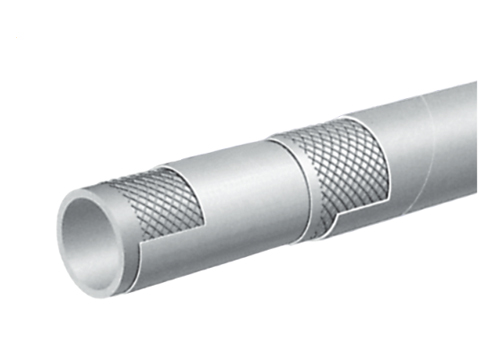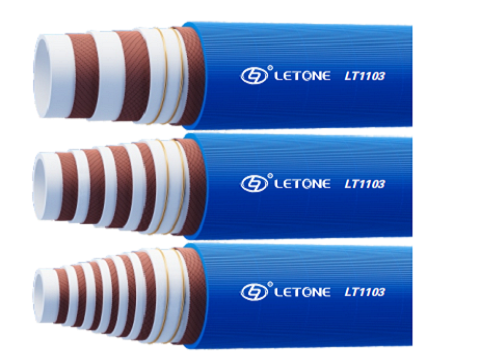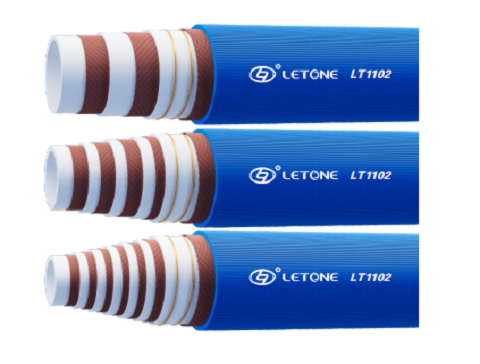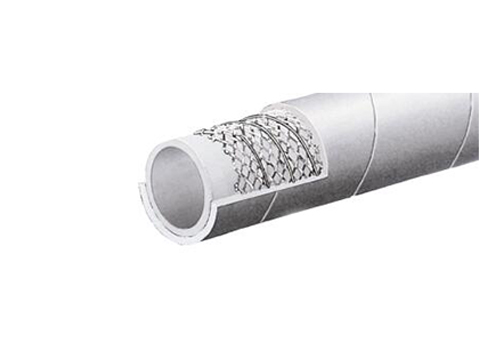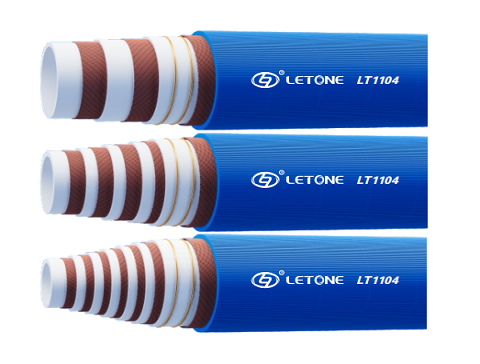As a professional solution in the field of gypsum-based building materials transportation, the gypsum slurry concrete rubber hose breaks through the performance limits of traditional pipes with a triple anti-corrosion structure. It adopts a composite inner layer of fluororubber (FKM) and styrene-butadiene rubber (SBR), and a double-layer aramid fiber tensile layer, which can maintain a continuous working pressure of 12MPa in highly corrosive gypsum slurry with a pH value of 3-11. Passing the ASTM D471 medium resistance test certification, the inner rubber layer has a 200% increase in the permeability of calcium sulfate crystals, and the pipe wall wear is controlled at 0.05mm/thousand cubic meters. The uniquely designed spiral guide groove structure prevents deposition and agglomeration when the slurry flow rate reaches 3m/s, and achieves 1200 hours of continuous operation of a single pipe without blockage in the gypsum board production line, becoming the core artery of the production of new building materials such as desulfurized gypsum walls and self-leveling mortar.
Molecular-level anti-corrosion matrix: four-layer composite material
The technological breakthrough of the gypsum slurry conveying hose comes from the dual innovation of materials and structure:
Nano-level anti-crystallization inner layer: SBR mixed rubber with PTFE micropowder added, surface roughness Ra≤0.8μm, reducing the amount of gypsum crystal attachment by 90%;
Dynamic reinforcement layer: 1680D aramid fiber cross-woven at ±55°, tensile strength increased to 280N/mm², negative pressure resistance up to -0.08MPa;
Conductive protection net: Embedded copper alloy conductive net layer, stabilize the static electricity accumulation value below 0.5kV/m, and eliminate the risk of dust explosion;
External protective armor: Chlorosulfonated polyethylene (CSM) outer layer, acid and alkali resistance passed ISO 1817 standard 2000-hour immersion test.
In the phosphogypsum resource project, the hose continuously transported pH4.5 acidic slurry at a leakage rate of 0.8L/min, with a service life of 18 months, 3 times longer than conventional hoses.
Conquer all scenarios: From chemical plants to the efficiency revolution of prefabricated buildings
The adaptability of gypsum slurry concrete hose is reshaping the production boundaries of new building materials:
 Desulfurization gypsum treatment: At the outlet of the flue gas desulfurization tower, it can withstand 80℃ high-temperature slurry scouring, and the expansion rate of the pipe body is less than 0.8%;
3D printing architecture: 0.5mm inner diameter precision control to ensure the continuous and stable extrusion of gypsum-based printing materials;
Prefabricated wallboard: The anti-precipitation model has passed EN 12115 certification, achieving 98% fluidity retention rate in lightweight gypsum concrete transportation;
Mine backfill : Wear-resistant reinforced version in the paste pumping containing 30% quartz sand, set a single tube 100,000
Maximizing the efficiency of the hose requires the construction of a full life cycle management model:
Precise selection :
Pastes with solid content > 65% must use a guide groove structure pipe type (flow rate ≥ 1.5m/s)
When the temperature is > 60℃, a CSM outer sheath model (upper temperature limit 120℃) is required
Installation specifications :
Minimum bending radius ≥ 8 times the pipe diameter to prevent the aramid fiber layer from breaking
Set a rotating hanger every 15 meters to eliminate the distortion of the pipe body caused by the conveying torque
Intelligent monitoring :
Built-in RFID chip monitors the pipe wall thickness in real time (automatic alarm at the wear threshold)
Start the automatic pulse cleaning program when the flow fluctuation is > ±15%
.
Desulfurization gypsum treatment: At the outlet of the flue gas desulfurization tower, it can withstand 80℃ high-temperature slurry scouring, and the expansion rate of the pipe body is less than 0.8%;
3D printing architecture: 0.5mm inner diameter precision control to ensure the continuous and stable extrusion of gypsum-based printing materials;
Prefabricated wallboard: The anti-precipitation model has passed EN 12115 certification, achieving 98% fluidity retention rate in lightweight gypsum concrete transportation;
Mine backfill : Wear-resistant reinforced version in the paste pumping containing 30% quartz sand, set a single tube 100,000
Maximizing the efficiency of the hose requires the construction of a full life cycle management model:
Precise selection :
Pastes with solid content > 65% must use a guide groove structure pipe type (flow rate ≥ 1.5m/s)
When the temperature is > 60℃, a CSM outer sheath model (upper temperature limit 120℃) is required
Installation specifications :
Minimum bending radius ≥ 8 times the pipe diameter to prevent the aramid fiber layer from breaking
Set a rotating hanger every 15 meters to eliminate the distortion of the pipe body caused by the conveying torque
Intelligent monitoring :
Built-in RFID chip monitors the pipe wall thickness in real time (automatic alarm at the wear threshold)
Start the automatic pulse cleaning program when the flow fluctuation is > ±15%
.

